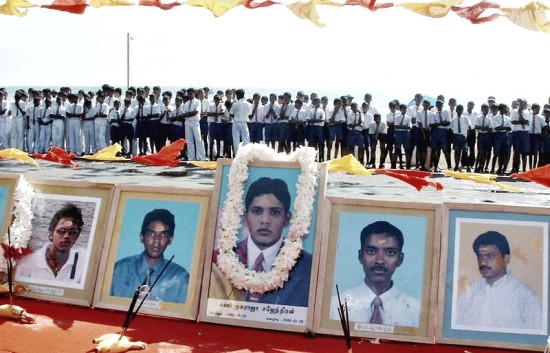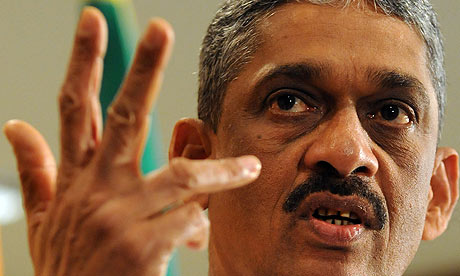The cannibalising impunity epidemic
“We have now sunk to a depth at which the restatement of the obvious is the first duty of intelligent men”: George Orwell (The Adelphi – January 1939)
The murdered five
On January 2nd, 2006, five students were murdered in the Town of Trincomalee. The government initially claimed that these were LTTE cadres who died when the bomb they were carrying exploded, prematurely. The cover-up

Memorial for the five students from Trincomalee who were brutally gunned down by the Sri Lanka armed forces
backfired unexpectedly, when a courageous Judicial Medical Officer revealed that the five young men had been shot to death, execution-style. Forced to acknowledge the crime, the regime resorted to subverting justice; judges were transferred, witnesses intimidated and victims’ families harassed. The case was shifted to a court in another province, and allowed to die.
Sarath Fonseka and the cover up
Gen. Sarath Fonseka was the Army Commander, and a member of the de-facto ruling triumvirate, when the Trincomalee murders happened. Indubitably he would have known of the plan to subvert justice and save the Trincomalee-murderers. Equally indubitably he would have seen nothing wrong with that exercise in impunity, because the victims were Tamils and the suspects were men in uniform .
What goes around comes around
Four years later it was his turn. On 8th February 2010, the military police and the army raided Gen. Fonseka’s political office, assaulted and handcuffed their former commander and dragged him away to incarceration like a common criminal – or terrorist – suspect.
Premachandra’s downfall
Bharatha Lakshman Premachandra was an Advisor to the President and the Kolonnawa SLFP Organiser when Gen.

A brutal army officer in his time and once riding high as part of the Rajapaksa cabal,
former army commander Sarath Fonseka doesn’t seem to know what hit him!
Fonseka was arrested and his family persecuted. He did not condemn the criminal-injustice Gen. Fonseka was subjected to. Perhaps he even organised a demonstration in his electorate decrying Gen. Fonseka as a traitor.
Less than two years later, Mr. Premachandra was dead, killed in a gang-battle with Parliamentarian and Monitoring MP of the Defence Ministry Duminda Silva. The regime used the same concoction of tactics as in the Trincomalee murder case to subvert justice and save Mr. Premachandra’s alleged killers.
Is it enough to be Sinhala Buddhist and SLFP?
The five students killed in Trincomalee were Tamil. The very Sinhala-Buddhist Army Commander who enjoyed the power of life and death over all Tamils would never have believed that their fate foreshadowed his own.
Mr. Premachandra would have considered himself even safer. After all, he was not just a Sinhalese and a Buddhist but also a SLFPer, a Rajapaksa loyalist and a friend of the President. When Mahinda Rajapaksa was sidelined in his own party, Mr. Premachandra risked the displeasure of President Chandrika Bandaranaike Kumaratunga and stood by Mr. Rajapaksa. Given this history, he had every reason to believe that he was immune from the germ of impunity.
Duminda Silva -will he get his turn?
Today Duminda Silva is strutting about, revelling in his ill-gotten freedom. But even his impunity is conditional and impermanent. He will be above the law so long as he retains Gotabhaya Rajapaksa’s patronage. The day he ceases being a Rajapaksa-pet or outlives his uses, his impunity would end.
Concentric circles of protection and privilege
In Rajapaksa Sri Lanka, impunity works in concentric circles. The outermost circle is occupied by the Sinhalese who are more protected than Tamils or Muslims; Sinhala-Buddhists are safer than Sinhala Christians; SLFPers are less likely to be persecuted than non/anti-SLFPers; Rajapaksa loyalists enjoy far greater leeway than even senior SLFP leaders; Close Rajapaksa kith and kin have more impunity than Rajapaksa loyalists.
Rajapaksas have total impunity
But it is the Ruling Siblings – and their intimate family members – who enjoy total impunity, permanently. Everyone else, including Rajapaksa-pets of the moment, enjoy only a conjunctural, transient impunity, which is conditional on their capacity to retain the affections/fulfil the demands of their patrons.
The fate of the military intelligence officer, who, inadvertently, caused the ire of Minister Mervyn Silva’s son, is a morality tale about Rajapaksa Rule.
The lesson is simple: no citizen can acquiesce in the persecution of a fellow citizen without undermining his own right
to justice. We cannot oppose abuse and injustice piecemeal, because impunity knows no borders and respects no differences. Every act of abuse and injustice must be opposed and resisted, irrespective of the identity of the target/victim. Because what happened to the Tamil students in Trincomalee can happen to any young Sri Lankan, anywhere; the fate of Sarath Fonseka can be the fate of any Rajapaksa opponent, as the sudden arrest of Asath Sally, (a vocal critic of the Ruling Siblings and their BBS-cohorts) demonstrates; even senior SLFP leaders cannot think themselves safe, after the manner in which the Bhratha-Duminda saga ended.
In Rajapaksa Sri Lanka, only the Rajapaksas are really, truly safe.
Self-inflicted Ills
A war which involved saturation bombing and incessant shelling of highly populated areas was called a humanitarian operation. A zero-civilian casualty myth was maintained by imposing the Tiger-label on all those killed by Lankan bombs and shells. Barbed wire camps, incarcerating more than three hundred thousand civilians, were called welfare villages.
These were such obvious, impossible, outrageously ludicrous lies, which went against reason, intelligence and decency. And yet we, the Sinhalese, accepted all that and turned a blind eye to the suffering of a segment of our own populace.
Without the ‘humanitarian operation’ myth, the ‘traitor’ label could not have been affixed on Gen. Fonseka; without the ‘welfare villages’ lie, Impeachment could not have been passed off as ‘due process’.
If Tamil society held Mr. Pirapaharan accountable for his wrongful acts during the First Eelam War, he many not have had the opportunity to develop into the monster he eventually became. But Tamil society, by and large, did not, because of its justifiable anger at the Lankan state and the Sinhala South over Black July.
Tamils more effective
The Tigers were more effective than their competitors at challenging Colombo and punishing the South; and for these reasons their budding intolerance and nascent despotism was glossed over by most Tamils. Once the Tigers turned themselves into the only game in town, it was easy to equate opposition to the LTTE with disloyalty to the Tamil cause. By then it was too late to rein the Tiger in.
Just as the Tigers justified the unjustifiable in the name of national liberation, the Rajapaksas justified the unjustifiable in the name of patriotism and anti-terrorism. This is how they resolved the yawning-gulf between their rhetoric about a zero-civilian casualty humanitarian offensive and the starkly different reality of the Fourth Eelam War.
Southern patriots
This is the manner in which they are resolving the abysmal gaps between their words and deeds in the South, from the impeachment-travesty to l’affaire Duminda, from price hikes to corruption and waste.
The Southern ‘patriots’, who danced in the streets and ate kiribath to celebrate the victorious end to the war, without sparing a thought for their Tamil compatriots languishing in fear and want, would never have dreamt that someday ‘Ape Anduwa’ would turn on them.
We have become a nation of ostriches. We have learnt to shut our eyes and close our ears and dull our minds to the proliferation of abuse, injustice and impunity. We prefer blindness to sight, deafness to hearing, insensibility to awareness and ignorance to knowledge, so that we can sleep undisturbed and wake up untroubled by nothing other than the purely personal and private.
Until an accidental encounter with some Rajapaksa acolyte can transform even the most un-political Sinhala-Buddhist into a criminal, a traitor or just a victim.

